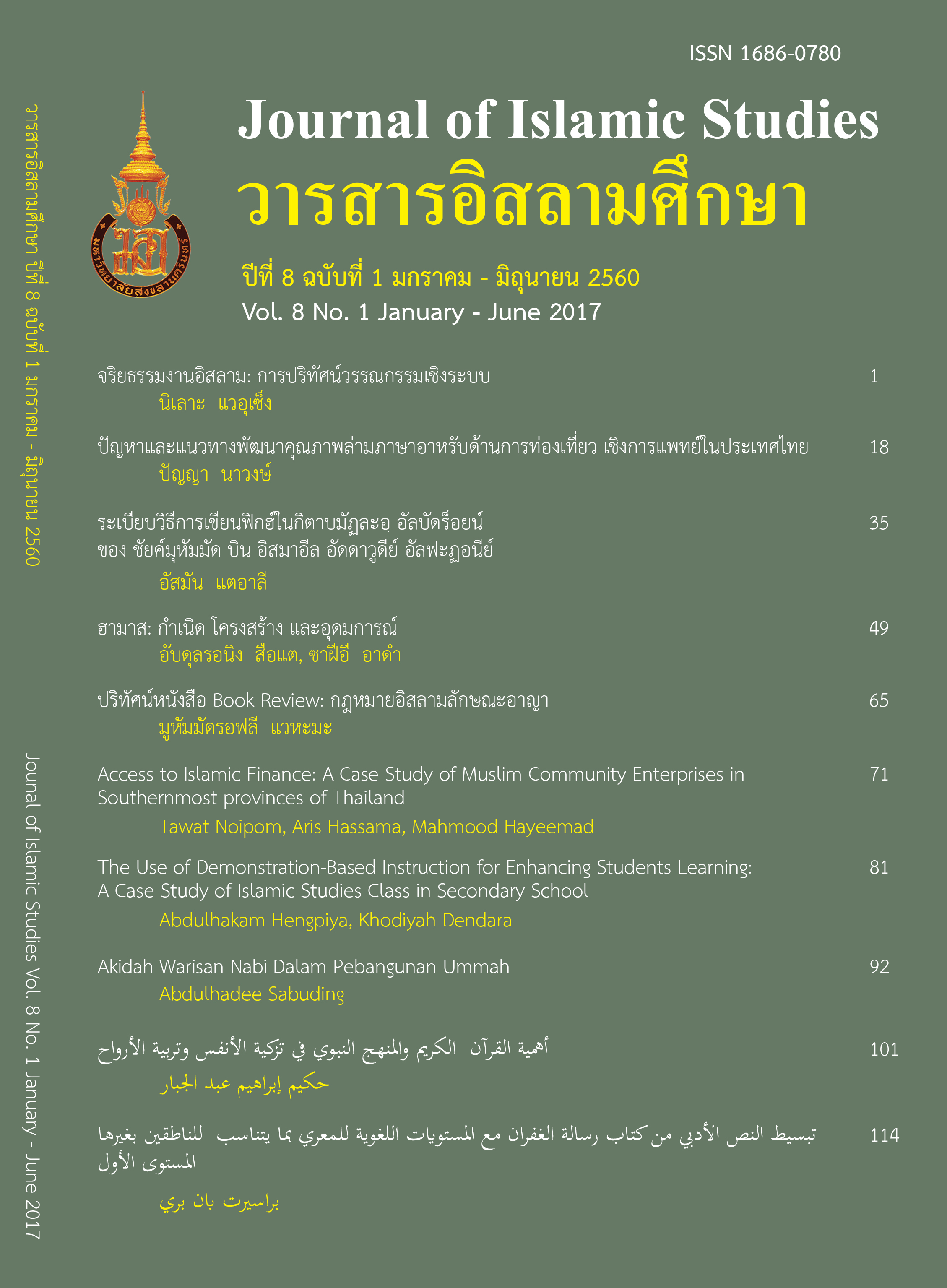Hamas: Its Emergen ce, Structure and Ideology
Keywords:
Hamas, Emergence of Hamas, Structure of Hamas, Ideology of HamasAbstract
This article is scholarly adopted analytically and deducted in descriptive methodology. The objectives are 1) to study the emergence of Hamas, 2) to study the structure of Hamas and, 3) to investigate Hamas’s ideology. It also tries to explain the ideological shift of Hamas which has been evolving so far.
The study found that: 1) Hamas is a movement evolved from the Movement of Ikhwan al-Muslimeen. Both have strong mass bases. They have certain objectives and played a crucial role in campaigning against Israel and claiming the occupied Palestinian territories by Israelis. By comparison, Hamas’s anti-State of Israel stance is ideologically and practically more violent since its beginning. 2) Structurally, since Hamas has had long experiences in organizing and fighting against Israel, it has rather complete semi-state mechanisms such as executive, political, economic, information, foreign, and military affairs. On the other hands, it also runs a militant unit of Izzaddin Qassam, Intelligence cell, and Commandos, each with different duties but similar goals, namely liberating all the occupied territories and reinstituting the Islamic way of life in Palestine. In 2006 Palestinian general election, Hamas could win both in West Bank and Gaza Strip areas, thus, forming the coalition government (Palestinian National Authority=PNA). Despite the serious internal conflict that destabilized and divided the shared Governing bodies, Hamas could set up their own Palestinian governing entity in Gaza. This recent political development has led to the better, more complex and more potential changes in the Movement’s structure and ideology. And 3) Ideologically, indeed Hamas is not hostile to the Jews due of religion, but because Hamas believed that Israeli Forces have usurped and occupied the Palestinian and Islamic land in Palestine, therefore, any recognition of Israel is considered as betraying Islam. Hamas has also adopted Jihad in fighting against Zionists and Israel.
References
ชัยวัฒน์ สถาอานันท์. (2532). “ปาเลสไตน์” ใน เอเชียรายปี 2532/1989. กรุงเทพฯ: สถาบันเอเชียศึกษา จุฬาลงกรณ์มหาวิทยาลัย.
ฮาฟิส สาและ. (2549). “เส้นทางการเมืองของฮามาส: ภาพสะท้อนการเมืองอิสลามในปาเลสไตน์” ใน เอเชียปริทัศน์. ปีที่ 27 ฉบับที่ 2 กรกฎาคม - ธันวาคม 2549 กรุงเทพฯ: จุฬาลงกรณ์มหาวิทยาลัย.
Akhbarzadeh, Shahram (Ed.). (2012). Routledge Handbook of Political Islam. London and New York: Routledge Taylor and Francis Group.
Broning, Michael. (2011). The Politics of Change in Palestine, New York: Pluto Press.
Hamas. The Covenant of The Islamic Resistance Movement 1988. Article 6, Article 9, Article 11, Article 12, Article 13, Article 15, Article 21, Article 22.
Majeed, Akhtar (Ed.). (1996). Encyclopaedia of West Asia. Aligarh: Centre of West Asian Studies, Aligarh Muslim University Press.
Majeed, Akhtar. (1996). West Asia: An Introduction. Aligarh, India: Centre of West Asian Studies, Aligarh Muslim University.
McGregor, Andrew. “Jihad and the Rifle Alone: ‘Abdullah ‘Azzam and the Islamist Revolution,” in The Journal of Conflict Studies (Fall 2003), Fredericton and Saint John: University of Brunswick.
Nüsse, Andrea. (1998). Muslim Palestine: The Ideology of Hamas. Amsterdam: Hardwood Academic Publishers.
Shaul Mishal and Avraham Sela. (2000). The Palestinian Hamas: Vision, Violence and Coexistence. New York: Columbia University Press.
Shehatah, Samer S (Ed.). (2012). Islamist Politics in the Middle East. New York: Routledge.
Usher, Grahem. “Hamas Rising” in Middle East International, no 686, 25 October 2002.
Ziad Abu-Amr. (1994). Islamic Fundamentalism in the West Bank and Gaza: Muslim Brotherhood and Islamic Jihad. Indiana: Indiana University Press.
Harakah al-Muqawamah al-Islamiyyah in www.hamas.ps - retrieved 11 May 2017.
http://en.m.wikipedia.org/w/index.php?title=Special:UserLogin&returnto=Palestine+legislati +election2%2C+2006 - retrieved 5 June 2017.
Downloads
Published
How to Cite
Issue
Section
License
Copyright (c) 2017 Journal of Islamic Studies, Prince of Songkla University, Pattani Campus

This work is licensed under a Creative Commons Attribution 4.0 International License.
All articles Published in The Journal of Islamic Studies are author’s opinions, and not the responsibility of the Faculty of Islamic Sciences nor the editorial board. However any citation should be referred to the journal.
















